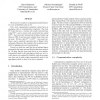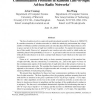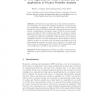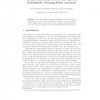SAGA
2007
Springer
15 years 8 months ago
2007
Springer
We present two results for computational models that allow error probabilities close to 1/2. First, most computational complexity classes have an analogous class in communication ...
101
click to vote
SAGA
2007
Springer
15 years 8 months ago
2007
Springer
The line-of-sight networks is a network model introduced recently by Frieze et al. (SODA’07). It considers scenarios of wireless networks in which the underlying environment has...
SAGA
2007
Springer
15 years 8 months ago
2007
Springer
In the layered-graph query model of network discovery, a query at a node v of an undirected graph G discovers all edges and non-edges whose endpoints have different distance from ...
145
click to vote
SAGA
2007
Springer
15 years 8 months ago
2007
Springer
We consider applications of probabilistic techniques in the framework of algorithmic game theory. We focus on three distinct case studies: (i) The exploitation of the probabilistic...
139
click to vote
SAGA
2007
Springer
15 years 8 months ago
2007
Springer
Abstract. Motivated by an application in project portfolio analysis under uncertainty, we develop an algorithm S-VNS for solving stochastic combinatorial optimization (SCO) problem...
SAGA
2007
Springer
15 years 8 months ago
2007
Springer
SAGA
2007
Springer
15 years 8 months ago
2007
Springer
Abstract. Devices connected wirelessly, in various forms including computers, hand-held devices, ad hoc networks, and embedded systems, are expected to become ubiquitous all around...
SAGA
2007
Springer
15 years 8 months ago
2007
Springer
A two-way finite automaton is sweeping if its input head can change direction only on the end-markers. For each n ≥ 2, we exhibit a problem that can be solved by a O(n2 )-state ...




